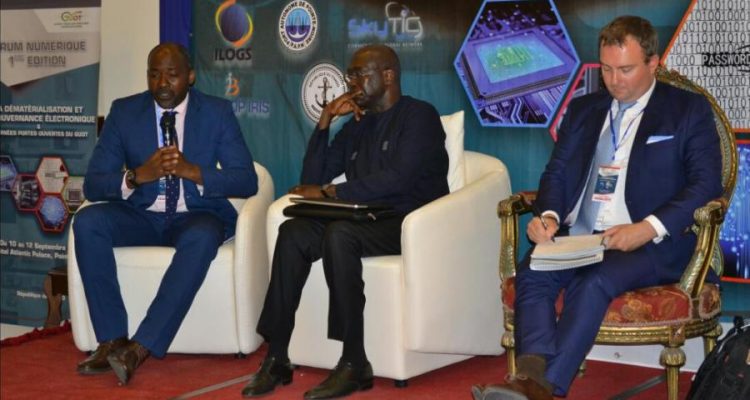[VIEWPOINT] – The African continent is under the veil of digital challenges. This was stated in Zoom Eco, Dr. Kodjo Ndukuma who takes part in the first Digital Forum of Congo. The opening of this meeting took place on Tuesday, September 11, 2018 in Pointe-Noire, Republic of Congo for 72 hours. High-level African and European experts participate.
According to Kodjo Ndukuma, in 2017, the world had 4.05 billion Internet users against 3.7 in 2016. (1) In 2015, the Forbes Africa Economic Forum (Brazzaville) reported:
700 million telephone subscribers on the continent, more than the United States and Europe in respective numbers of inhabitants;
10% of African Internet users in the world, low level of access to the Internet;
4% of GDP as the level of Internet revenues on the African market;
exceeding the 2013 threshold of $ 18 billion in Internet revenues;
exceeding the threshold of 1 billion mobile subscribers by 2025;
exceeding the $ 300 billion Internet contribution to Africa’s GDP by 2025. (2)
Abstract on digital issues and rights in Africa
Since the specific agreements of the World Trade Organization (1994-1997), African legislation has not yet finished framing the basic aspects of telecoms: sectoral regulation, universal service, full competition of the electronic market, resource management breeds (radio frequencies, numbering), electronic signature and evidence, national electronic payment system, protection of personal data.
In addition, the Internet brings the convergence of Telecom, IT and Audiovisual. Even though these initial issues are far from being apprehended, the technological phenomena, linked to the digital, are at the base of the societal transformations which engage a shift of the paradigms of the law and the classical economies. Law is a political response to manage or project issues.
Digital technology, especially in Africa, calls for a move from sectoral legislation on basic telecoms and IT to multi-sectoral legislation following the global Internet and the merging of media or industries. Digital economy practices are developing in Africa, but there remains the need to understand the technical purpose of the digital society and its dematerialization axes, in the field of national and community rights.
Especially, the “mobile money” is this electronic money on the mobile phone supports. It is much more developed in Africa than in Europe and the United States. The low rate of banking in Africa has made the success of the facilities that GSM technology offers to the digital inclusion and consequently to the financial inclusion of populations, long neglected in informal sectors of the economy.
But, there is no development of original legislation or legal doctrine (literatures) prevalent in Africa, because the object, often mimed, of the European laws does not look at it for lack of big stakes.
In addition, data has become the new eldorado of the Net economy and the issue of cybercrime. With regard to the African system for the protection of personal data, only 21 African countries have laws on the 55 of the continent: South Africa (2013), Angola (2011), Benin (2009), Burkina Faso (2004), Cap- Green (2001), Comoros (2014), Ivory Coast (2013), Gabon (2011), Ghana (2010), Equatorial Guinea (2016), Mauritius (2004), Lesotho (2013), Madagascar (2014), Mali (2013), Morocco (2009), Niger (2017), Senegal (2008), Seychelles (1998), Chad (2015), Tunisia (2004) and Zimbabwe (2002). (3)
On these aspects, Africa lacks intellectual framing, to advance social practices and the law according to the challenges of dematerialization.
Awareness of elites and peoples about the geopolitics of cyberspace
The African digital economy is the product of globalization, its infrastructure operators are mostly foreign multinationals. Populations as users are becoming larger and more satisfied with the offer of services that their states alone could not offer them as a principle of mutability.
However, African states are entering a system economy, a lock economy without political and strategic preparation. The mastery of the patterns of the Internet and its architecture largely escapes African governments and intellectuals. The collective and elitist consciousnesses are not sufficiently enlightened on the real ones pertaining to the geopolitics of cyberspace, its geo-economy and its societal transformations.
L’Harmattan publishes its collection of “Digital Issues and Rights” for September, 2018 to meet the documentary need for the major issues raised here. In the collection, two books are forthcoming: on the first subject of the “Law of the Digital Economy: European and African Experiences,” and on the second subject of “Telecom and Digital Rights: Congolese Profiling and Comparative Foresight of France”. and Europe “.
Dr. Kodjo Ndukuma
Doctor of Juridical Sciences
From Paris 1 Pantheon University – Sorbonne
Professor of Law at the Protestant University of Congo


Leave a Reply